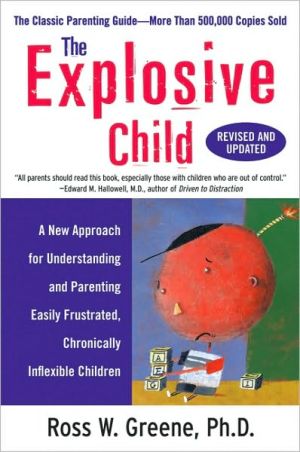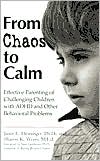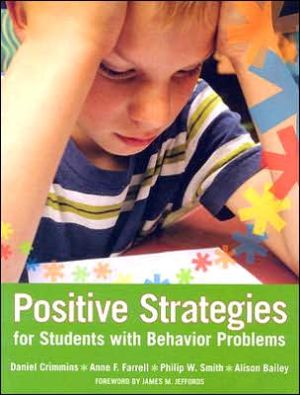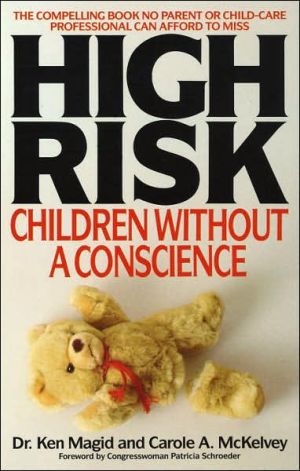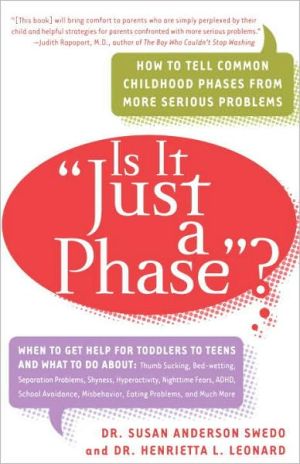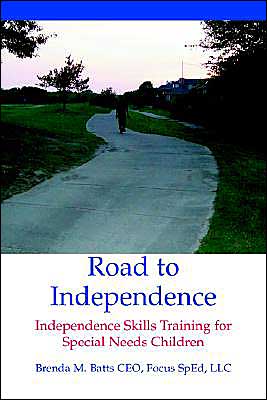The Explosive Child: A New Approach for Understanding and Parenting Easily Frustrated, Chronically Inflexible Children
What′s an explosive child? A child who responds to routine problems with extreme frustration-crying, screaming, swearing, kicking, hitting, biting, spitting, destroying property, and worse. A child whose frequent, severe outbursts leave his or her parents feeling frustrated, scared, worried, and desperate for help. Most of these parents have tried everything-reasoning, explaining, punishing, sticker charts, therapy, medication-but to no avail. They can't figure out why their child acts the...
Search in google:
Almost everyone knows an explosive child, one whose temper and extreme noncompliance leaves his or her parents standing helpless in fear, frustration, and guilt. Now, in The Explosive Child, Dr. Ross Greene, the noted therapist who has worked with thousands of these children, offers parents good news: These kids aren't bad; rather, they suffer from a physiological deficiency in frustration tolerance and flexibility. This compassionate book helps parents grasp the underlying problems of explosive children, defuse explosive episodes, and reduce tension and hostility levels for the entire family by providing invaluable tools for coping with this behavioral disorder. Edward Hallowell All parents should read this book, especially those with children who are out of control. Ross Greene presents a loving, rational, and research-based approach to dealing with problems that most parents have either felt were their own fault or were unsolvable. I could not recommend this book more highly.
Chapter One\ The Waffle Episode\ Jennifer, age eleven, wakes up, makes her bed, looks around her room to make sure everything is in its place, and heads into the kitchen to make herself breakfast. She peers into the freezer, removes the container of frozen waffles, and counts six waffles. Thinking to herself, "I'll have three waffles this morning and three tomorrow morning," Jennifer toasts her three waffles and sits down to eat. \ \ Moments later, her mother and five-year-old brother, Adam, enter the kitchen, and the mother asks Adam what he'd like to eat for breakfast. Adam responds, "Waffles," and the mother reaches into the freezer for the waffles. Jennifer, who has been listening intently, explodes.\ "He can't have the frozen waffles!" Jennifer screams, her face suddenly reddening.\ "Why not?" asks the mother, her voice and pulse rising, at a loss for an explanation of Jennifer's behavior.\ "I was going to have those waffles tomorrow morning!"\ Jennifer screams, jumping out of her chair.\ "I'm not telling your brother he can't have waffles!" the mother yells back.\ "He can't have them!" screams Jennifer, now face-to-face with her mother.\ The mother, wary of the physical and verbal aggression of which her daughter is capable during these moments, desperately asks Adam if there's something else he would consider eating.\ "I want waffles," whimpers Adam, cowering behind his mother.\ Jennifer, her frustration and agitation at a peak, pushes her mother out of the way, seizes the container of frozen waffles, then slams the freezer door shut, pushes over a kitchen chair, grabs herplate of toasted waffles, and stalks to her room. Her brother and mother begin to cry.\ Jennifer's family members have endured literally thousands of such episodes. In many instances, the episodes are more prolonged and intense, and involve more physical or verbal aggression than the one described above (when Jennifer was eight, she kicked out the front windshield of the family car). Mental health professionals have told Jennifer's parents she has something called oppositional-defiant disorder. For the parents, however, a simple label doesn't begin to explain the upheaval, turmoil, and trauma that Jennifer's outbursts cause. Her siblings and mother are scared of her. Her extreme volatility and inflexibility require constant vigilance and enormous energy from her mother and father, thereby lessening the attention the parents wish they could devote to Jennifer's brother and sister. Her parents frequently argue over the best way to handle her behavior, but agree about the severe strains Jennifer places on their marriage. Although she is above average in intelligence, Jennifer has no close friends; children who initially befriend her eventually find her rigid personality difficult to tolerate.\ Over the years, Jennifer's parents have sought help from countless mental health professionals, most of whom advised them to set firmer limits and be more consistent in managing Jennifer's behavior, and instructed them on how to implement formal behavior management strategies. When such strategies failed to work, Jennifer was medicated with innumerable combinations of drugs, without dramatic effect. After eight years of medicine, advice, sticker charts, time-outs, and reward pro-grams, Jennifer has changed little since her parents first noticed there was something "different" about her when she was a toddler.\ "Most people can't imagine how humiliating it is to be scared of your own daughter," Jennifer's mother once said. "People who don't have a child like Jennifer don't have a clue about what it's like to live like this. Believe me, this is not what I envisioned when I dreamed of having children. This is a nightmare."\ "You can't imagine the embarrassment of having Jennifer ‘lose it' around people who don't know her," her mother continued. "I feel like telling them, ‘I have two kids at home who don't act like this — I really am a good parent!' "\ "I know people are thinking, ‘What wimpy parents she must have ... what that kid really needs is a good thrashing.' Believe me, we've tried everything with her. But nobody's been able to tell us how to help her...no one's really been able to tell us what's the matter with her!"\ "I hate what I've become. I used to think of myself as a kind, patient, sympathetic person. But Jennifer has caused me to act in ways I never thought I was capable of. I'm emotionally spent. I can't keep living like this."\ "I know a lot of other parents who have pretty difficult children...you know, kids who are hyperactive or having trouble paying attention. I would give my left arm for a kid who was just hyperactive or having trouble paying attention! Jennifer is in a completely different league! It makes me feel very alone."\ The truth is, Jennifer's mother is not alone; there are a lot of Jennifers out there. Their parents quickly discover that strategies that are usually effective for shaping the behavior of other children — such as explaining, reasoning, reassuring, nurturing, redirecting, ignoring, rewarding, and punishing —don't have the same success with their Jennifers. Even formal behavior management programs — sticker charts, contingent rewarding and punishing, and time-outs — and commonly prescribed medications have not led to satisfactory improvement. If you started reading this book because you have a Jennifer of your own, you're probably familiar with how frustrated, confused, angry, bitter, guilty, overwhelmed, worn out, and hopeless Jennifer's parents feel.\ Besides oppositional-defiant disorder, children like Jennifer may be diagnosed with any of a variety of psychiatric disorders and learning inefficiencies, including attention-deficit/ hyperactivity disorder (ADHD), mood disorders (bipolar disorder and depression), Tourette's disorder, anxiety disorders (including obsessive-compulsive disorder), language-processing impairments, sensory integration dysfunction, nonverbal learning disability, reactive attachment disorder, and Asperger's disorder. Such children may also be described as having difficult temperaments.
AcknowledgmentsPreface1The Waffle Episode12Terrible Beyond Two93Pathways to Inflexibility-Explosiveness264Inflexible-Explosive Faces565The Truth About Consequences856Corrective Lenses1017Basket Case1308Brain Chemistry1809Roadmaps19210Family Matters21711All Things Considered23812User-friendlier Schools26413Change of Venue29814Children Do Well If They Can309Additional Resources and Support315Index321About the Author335
\ From Barnes & NobleBy teaching parents how to communicate with an inflexible son or daughter who feels there is no way out other than to throw a fit, The Explosive Child miraculously helps families unlearn the habits that lead to incendiary behavior. The book equips parents with the necessary skills to defuse and even prevent the intense situations that all-too-frequently arise with a volatile child.\ \ \ \ \ Edward HallowellAll parents should read this book, especially those with children who are out of control. Ross Greene presents a loving, rational, and research-based approach to dealing with problems that most parents have either felt were their own fault or were unsolvable. I could not recommend this book more highly.\ \
